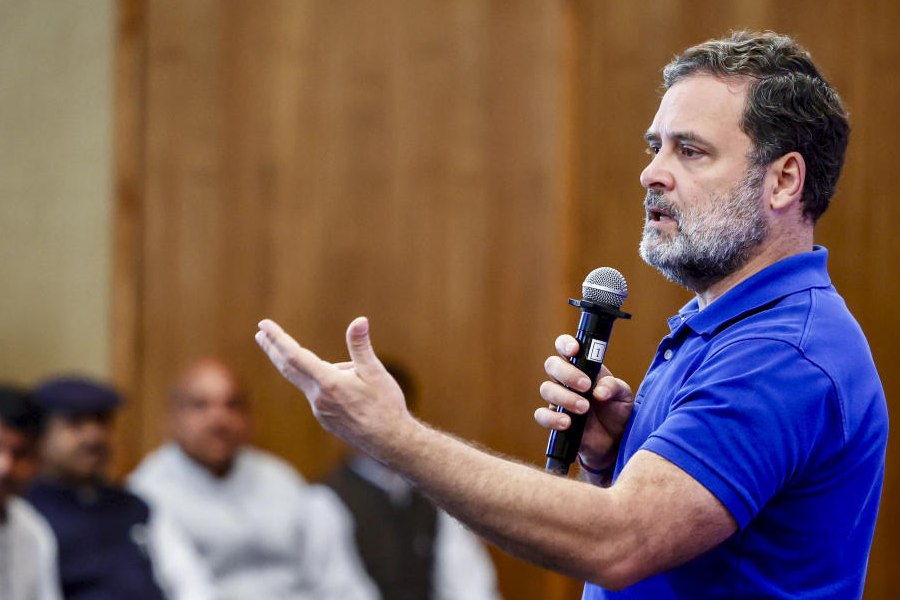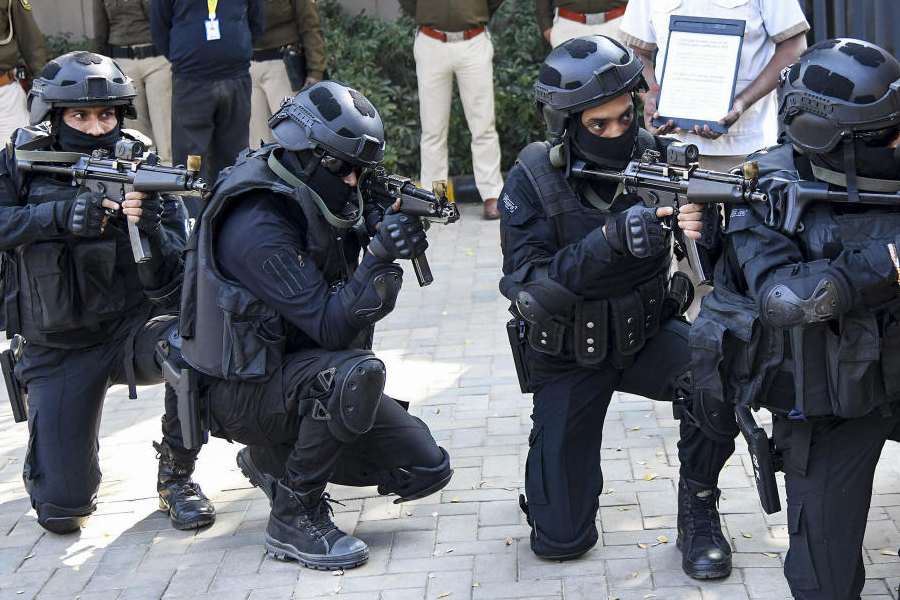 |
Granville “Red” Austin, 87, passed away at his home on Capitol Hill in Washington DC on July 6. His name is known in India because of two definitive books that he wrote, one about the making of the Indian Constitution (Indian Constitution: Cornerstone of a Nation, 1966), and the other about the trajectory of that Constitution over nearly 40 years of its existence (Working a Democratic Constitution, 1999). In 2011, he was awarded a Padma Shri by the government of India. I had long known these books, but last year I got to know Red and his wife, Nancy, as my landlord and landlady. In the summer of 2013, I spent two months as a Kluge Fellow at the Library of Congress in Washington DC, and I rented part of their house for the duration of my fellowship.
The place, a large rambling townhouse with an unruly garden and several cramped outhouses, seemed more like a southern building, with running verandahs, porches and balconies to sit out on a warm day, and its old woodwork intact from when the Austins had purchased it a few decades ago. An American writer friend, originally from Chicago, came to stay with me for a couple of days towards the end of my sojourn. She said she felt like we were in a William Faulkner novel, so original was the furniture, so quaint the decor. The small but friendly Lincoln Park was at the end of the street, and the charming Eastern Market was hardly three blocks down. I went to my cubicle in the Kluge Center every day, a 20-minute walk along Independence Avenue lined with handkerchief-sized gardens laden with late summer flowers. Through my office window I stared for hours at the US Supreme Court, and thought about B.R. Ambedkar, father of the Indian Constitution.
Having struggled through two blistering summers in Delhi, I came to love the residential neighbourhood of Capitol Hill, feeling like a student again, free of domestic responsibilities and pleasantly preoccupied with my research. But most of all I liked the owners downstairs, so well-known in my academic world, and yet so comfortably, unassumingly, and unobtrusively sitting at their kitchen table and smiling at me, chatting casually with me as I went in and out of their house. A couple of newly-weds, both of whom worked for American lawmakers, rented one of the tiny houses that stood along the periphery of the property. They brought home a black and brown beagle puppy named Nigel. Some of our time together was spent playing with him, watching him run in circles all over the garden, trampling on the plants, chasing squirrels, getting his paws and ears wet in the sprinkler, and generally entertaining us with his mad fly-away energy while his owners tried in vain to teach him to sit, stay and take a dog-biscuit politely from human hands.
Red — so nicknamed because he once had a head full of red hair — reminded me of my maternal grandfather, Sardar Sher Singh, who passed away 20 years ago in Delhi, and my husband’s maternal grandfather, an energetic former headmaster who lives in his village house up in Kashmir. What drew me to Red as a grandfatherly figure was his white-bearded visage, or perhaps it was his physical frailty, the twinkle in his eye unrelated to the decrepitude of his body, and the particular kind of sweet, unalloyed, wordless affection that emanates only from the very young or the very old. He and Nancy invited me to supper a few days after I moved in. Red was in great spirits. He showed me a bottle of single malt, but proceeded to drink red wine.
We talked about India — he remembered and asked after my senior colleagues, Rajni Kothari, D.L. Sheth and Ashis Nandy. He had known many politicians, bureaucrats, academics and journalists from the eras of Indira Gandhi and Rajiv Gandhi, people whose names were familiar to me from my childhood or because they had been my father’s friends. But his memories of his first stint in India during the early 1960s were much fuzzier. He could hardly recall any names at all, even though he could recount incidents that had occurred, and knew that certain persons had been particularly helpful to him in his research.
Through one of those accidents of history, he and Nancy seemed not to have crossed paths with the other celebrated American scholars in Nehru’s Delhi: Lloyd and Susanne Rudolph, who became professors of political science at the University of Chicago. The Rudolphs published their pathbreaking work in 1967, The Modernity of Tradition, which was partially about Gandhi and partially about caste, almost simultaneously with Red’s Oxford thesis about the Indian Constitution. The Rudolphs once told me that they had had at least one meeting with Nehru at his Teen Murti residence, during which both Nehru and Lloyd offered to light Susanne’s cigarette, but she declined her husband and accepted the prime minister’s match instead. “It is one of the great sorrows of my life,” Red said, “that I never met Jawaharlal Nehru.” (I wrote down that phrase as soon as I went upstairs after dinner).
Later in a recorded conversation, Red explained that he had written to the concerned official to ask for access to government files on the the Constituent Assembly debates. Nehru apparently had scribbled on the margins of Red’s application letter, “Help this man.” The right doors were thrown open, of course, but they missed meeting in person, and Nehru died in May 1964. The house on 11th Str. SE was filled with artifacts and knick-knacks from India. Red was very proud of a gigantic wooden sculpture of Nandi, Shiva’s bull, and an enormous statue of Ganesh, with one of his wives, Riddhi or Siddhi, perched on his elephantine thigh. I told Red about the handwritten manuscript of Abraham Lincoln’s historic Gettysburg address I had seen in an exhibition at the Library of Congress, and about President Barack Obama’s address on the 50th anniversary of Martin Luther King Jr.’s historic “March on Washington” that I went to hear on the Mall. Occasionally, I tried to discuss my ongoing research about Ambedkar with him.
I discovered that before me the historian, Ramachandra Guha, had passed through that house, and sometimes I found junk mail for the sociologist Nandini Sundar in my letter box. “Where’s your Padma Shri award?” I asked. Nancy produced a photograph showing them both in formal clothes, holding up a certificate signed by President Pratibha Patil. “I don’t know where I put it,” Red said, off-handedly, “it might be somewhere in the basement, or maybe not.” When I looked disappointed, he smiled impishly. “When you write about me, one day, title your piece ‘The only Padma Shri in Vermont’ — even though I can’t produce the evidence.”
Red was repeatedly dismissive of his reputation as a scholar. I found this puzzling. He always joked about his erudition, and waved away any queries I had (and I had a few). My husband — the writer and journalist, Basharat Peer — was supposed to visit me in Washington. Nancy looked him up on Google on her iPad. They asked for copies of both our books, which I duly ordered on Amazon, inscribed, and presented to them. They made much of my scholarship and my husband’s reportage, but were shy and evasive about Red’s work.
They did ask me to get a copy of Red’s memoir about growing up in Vermont and New Hampshire, titled Retrieving Times (2008), which Red had to order from his publisher and asked me, with great embarrassment, to pay for. He inscribed it, in a shaky hand, with his characteristic humour, “To Ananya, fellow in Indian confusion, in friendship, Red Austin.” I ordered a few copies. One I gifted to my friend, the journalist and travel writer, Matthew Power, who lived in Brooklyn, NY, and was from Middlebury, VT, a state he loved as much as Red did. As it happened, Matt passed away tragically on assignment in Africa in March this year — he was 39 years old. The sight of the book now hurts me doubly.
Red never became a career academic. He went to Dartmouth College, and earned his DPhil in modern history from Oxford University, but he never taught anywhere and didn’t publish anything besides his two books on the Indian Constitution and the Vermont memoir towards the end of his life. Upendra Baxi, in a long and rather critical review of Red’s second book published in the Economic and Political Weekly, voices his puzzlement and discomfort at Red’s silence, the fact that he never wrote either scholarly or journalistic articles on contemporary Indian politics, on the actual life, as it were, of the Constitution of India. Baxi almost berates Red for being an “independent scholar”, though it’s not clear whether this ‘independence’ should be read as intellectual objectivity or as a lack of political engagement. As someone close to the political life of the law in India, Baxi has objections to both types of remove. The review is sarcastically titled “Saint Granville’s Gospel: Reflections” (EPW, March 17-23, 2001).
I couldn’t quite sort out the matter in my head when I was living at close quarters with Red. But now I think the explanation is rather simple. Red worked for the American government, not as a diplomat posted overseas but writing intelligence reports in the departments of state, health, education and welfare. This meant that he could neither have a regular academic career, nor contribute to newspapers and magazines — though as a young man, fresh out of college, he had tried his hand at journalism — nor advertise and disseminate his scholarly expertise in all of the ways that academics based in universities and think-tanks might normally do. He had to keep a low profile. India was much more his personal passion than his professional area of expertise — he actually spent the bulk of his time writing in-house state-department reports on the so-called “Near East” and “Far East.” The Austins had lived — quite happily, I gathered — in Vietnam and Beirut, in Oxford and Paris, and Delhi was just one of the stops in their life together. Eventually with four children to raise and educate, they settled down in DC.
To mark 60 years of the Constitution, I guest-edited an issue of the journal, Seminar (No. 615, November 2010). We invited Red to contribute, naturally. After many machinations and interventions, involving Seminar’s publisher, Tejbir Singh, and the retired Columbia University professor, Ainslee T. Embree, among others, he agreed to send us a short note. It was sharp, wry and perceptive, like the man himself, with a deeply recessed irony that came from a lifetime of carefully cultivated reticence — and perhaps from his terms of reference with the United States government. He wrote, “There is a vast amount of good to say about the Constitution and Indian achievements under it. Regrettably, there is also much to say about Indian sins of omission... The question is still asked: Why does the Constitution continue to fail us? The answer: We have ourselves to blame, is seldom heard... I take no comfort in the awareness that American government, politics and economy are in a similarly parlous condition. It seems that human beings construct temples called democracies, but then pay insufficient attention to those who become the clergy.”










